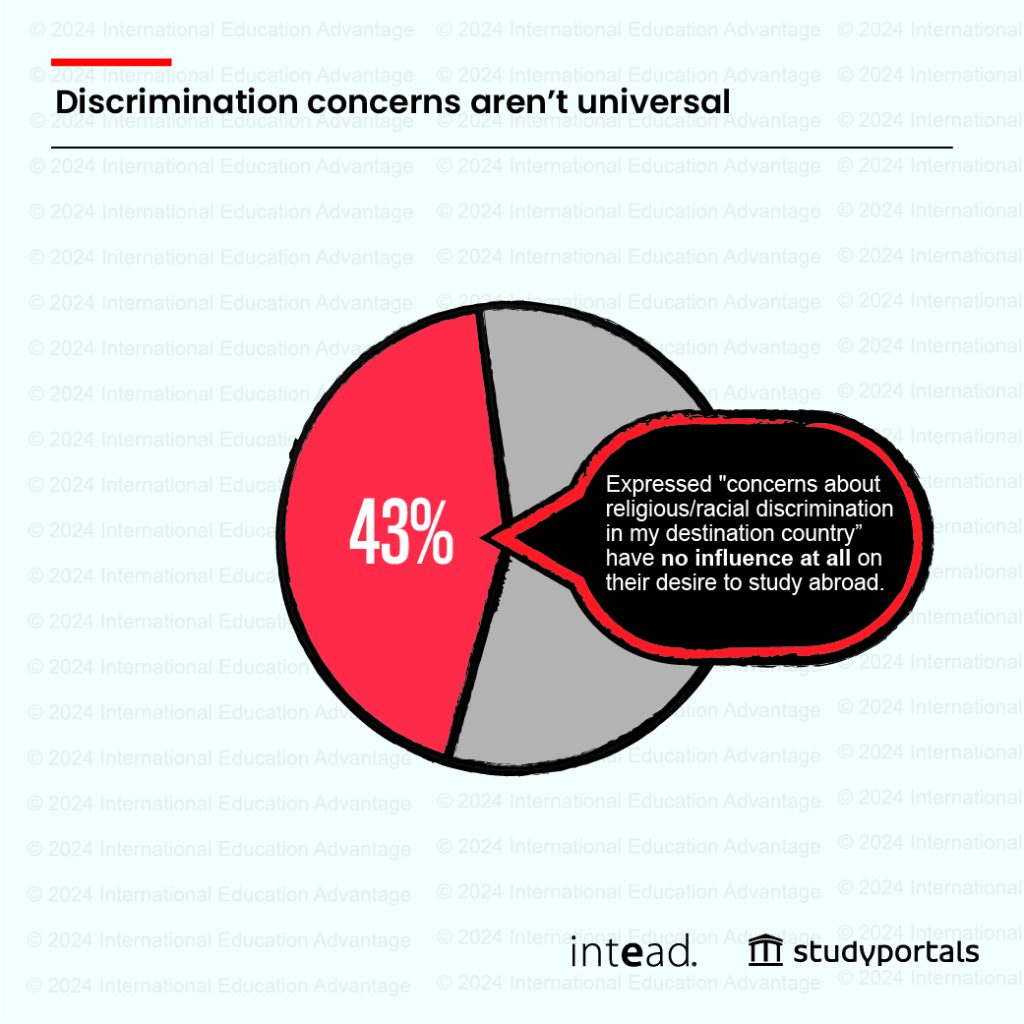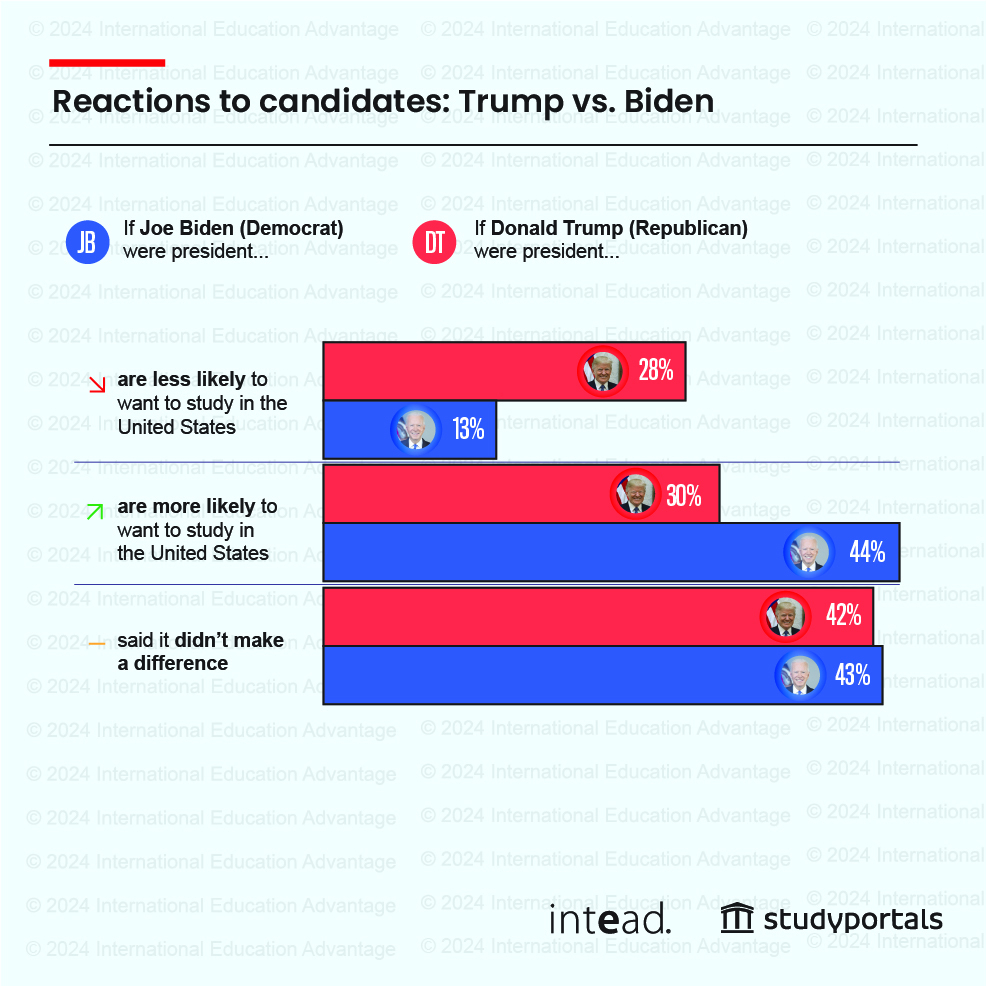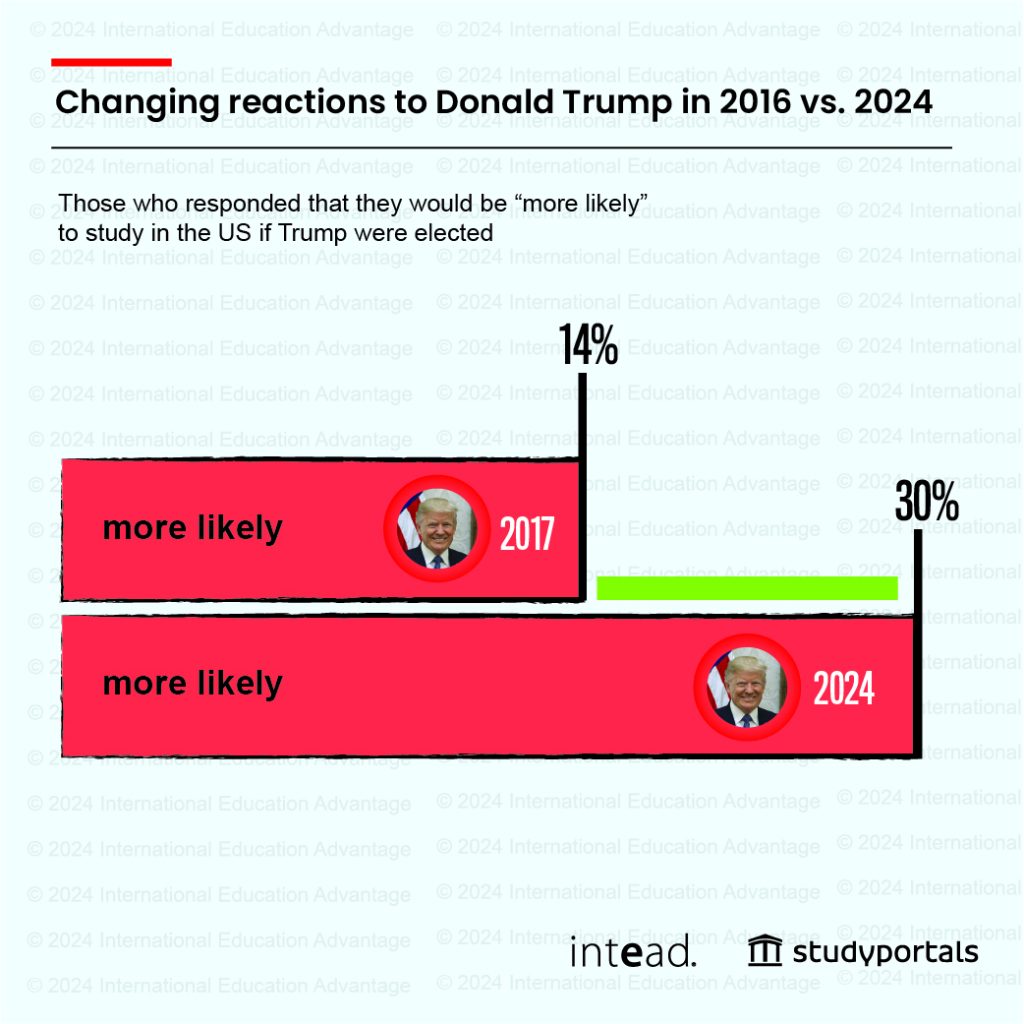Will a Republican or Democrat victory affect the decision of students to study in the US?
As of 21 July, President Biden has dropped out of the presidential race. Find our reflections and caveats to the report on that at the end of the piece.
The United States is in the throes of a contentious election season, and US academic leaders are grappling with two major unknowns:
- How will the upcoming US presidential election impact student enrolment?
- What changes in US policies will influence international student recruitment?
Intead, in partnership with global study choice platform Studyportals, launched an international student focused survey to Studyportals account holders between 11 March and 19 April 2024. The result: 2492 respondents from 106 countries.
Our resulting 2024 ‘Know Your Neighborhood’ summary report presents and distils our findings as part of Intead’s continuing series on global student mobility trends. Here, we uncover and examine the pivotal factors guiding international students’ decisions to study abroad, exploring whether political leadership is a significantly influential factor.
Who responded, and what they care about
Our respondents reflect the cohort of most engaged international education-seekers that we’ve observed in recent years.
Geographically, the largest contingent hail from Africa and Asia (largely India). In navigating study abroad options on social media, they predominantly rely on Facebook and YouTube, and their academic aspirations lean heavily towards graduate and post-graduate programs (38% and 34%, respectively), particularly in STEM fields.
Learning English fluently (58%), bringing home new skills (74%), and advancing their career (84%) all rank among the most important drivers for international students seeking to study abroad.

Amidst these significant motivational factors, socio-politically, 43% of respondents indicated that concerns about religious/racial discrimination, personal safety, and political instability had no influence at all on their decision to study abroad.

This reaction was even more aggressive in South America and Central America, where 70% and 63% respectively stated that concerns about personal safety in their destination countries had no impact on their study abroad plans.
Particularly for these regions, we believe that this finding suggests a familiarity with navigating complex socio-political environments, potentially desensitizing these respondents to what others may perceive as personal safety risks.
That still leaves 57% of respondents who acknowledge the influence of safety and acceptance concerns; however, the nearly half of respondents who expressed no concern at all challenge prevailing narratives about how much race based and other violence in a study destination may influence student decision-making.
We believe these findings highlight cultural differences around perceptions of safety and discrimination as well as the resolve of many students to pursue their academic goals despite potential challenges related to discrimination, safety, and political instability.
Battle at the ballot: shifting reactions to Trump and Biden
Our findings on the respondents’ reactions to Mr Trump are tamer in 2024 than they were in 2016.

Among the 30% of respondents in our 2024 data who supported a Trump presidency, responses highlight expectations of economic growth, job creation, and business-friendly policies.
These economic factors are seen as potentially beneficial to one’s career prospects and access to the US job market. Respondents seem to anticipate that the Trump administration’s emphasis on economic nationalism and reduced regulatory burdens will foster a favourable business environment.
Aside from the specific preferences for either Mr Trump or Mr Biden, we found a high percentage of 2024 respondents indicating that the political leadership in the United States ‘didn’t make a difference’—about 42% across the board—on their desire to study in the US.
This finding indicates a broader disconnect that these international students may be feeling; namely, the lived impact of any government leader’s policies on international students studying in the US feels less significant, and thus, may have diminished influence on their choice to study in the US or not.
Some education leaders may find this student thinking naïve. US presidents have a significant amount of power to limit international student access to the US institutions.
Deep differences from eight years ago and region to region
The contrast in preferences between studying while the country is led by Mr Biden or Mr Trump was most pronounced between North America and Australasia.
In response to a potential Biden presidency, 9% of North American respondents indicated they would be less likely to study in the US, while 46% expressed they would be more likely.
Conversely, under a Trump presidency, 55% of North American respondents said they would be less likely to study in the US, with only 23% indicating they would be more likely.
In Australasia, the preferences were nearly reversed. Under Trump, only 11% indicated they would be less likely to study in the US, while a substantial 56% stated they would be more likely.
The perception of Trump’s policies and rhetoric, often seen as racially charged, has elicited varied responses between predominantly white and non-white countries. In Australasia, where the population is approximately 75% white and conservative leadership is valued, such as Tony Abbott and Scott Morrison in Australia, there appears to be a greater appeal for Trump’s conservative ethos, compared to Biden’s more reformist approach among international education-seekers.
Looking again at our worldwide pool, we compare these sentiments in our current survey to our 2016/17 findings conducted before and shortly after Mr. Trump’s inauguration.

In 2016/17, 54% of global respondents said they were less likely to consider US studies under Trump. In Mexico, a stratospheric but unsurprising 80% expressed their disapproval, citing hesitance due to concerns over political hostility and visa policy changes under the Trump administration.
That said, both the 2017 and 2024 survey results reveal a significant portion of respondents expressing that political leadership in the destination country has no influence on their study abroad plans: around one-third of respondents in both periods (32% and 42%, respectively) expressed indifference. Does that 10% increase indicate a rise in student cynicism? Or is it naivete?
What this means for 2024/25 marketing and recruiting efforts
From surprising indifference among many respondents towards political leadership’s impact on their study abroad decisions and access, to stark regional contrasts in preferences between Biden and Trump, our 2024 survey reveals a spectrum of intriguing international perspectives on the future of education and global mobility.
When it comes to international education marketing in these interesting times, two recommendations are clear:
- If the Democratic candidate wins: emphasise alumni success stories with OPT and CPT to highlight career advantages for prospective students.
- If Trump wins: institutions with robust international partnerships can leverage them to deliver US degrees to students unable to travel to, or work in, the US due to restrictions that may be put in place. Based on Trump’s first term, the potential for stricter student mobility limitations is a realistic concern.
Stop Press! As of 21 July, President Biden has dropped out of the presidential race, endorsing his vice president, Kamala Harris, to run for office.
This provides a counterexample to research insights Intead and Studyportals gleaned from an international student survey conducted in March 2024.
While we explore throughout the summary report that international students considering the US are growing increasingly cynical about the effect that the presidency has on their experience in the US, the country’s push for Biden to leave the presidential race suggests a far more ‘hands on’ story within the US’s own domestic landscape.
These recent political developments leave room for new research into how the shift might impact the way international students, and other international groups, view the US. It raises awareness about how responsive the US public truly is to its leadership beyond simple partisan preferences.
What interests us is how this dynamism among US citizens affects the way prospective international students view the importance of the US’s political leader for themselves.
All told, our report remains an in-depth exploration into the evolving views of international students towards former President Trump, comparing current sentiments with those from our 2016 research on the US political scene.
As we explore whether current students have become more complacent or cynical about potential policy changes under Trump that could significantly impact their educational opportunities, the recent dramatic shift in the political landscape of the US seems to even more deeply underscore the need to understand how US political dynamics are really perceived by students—internationally and domestically.





